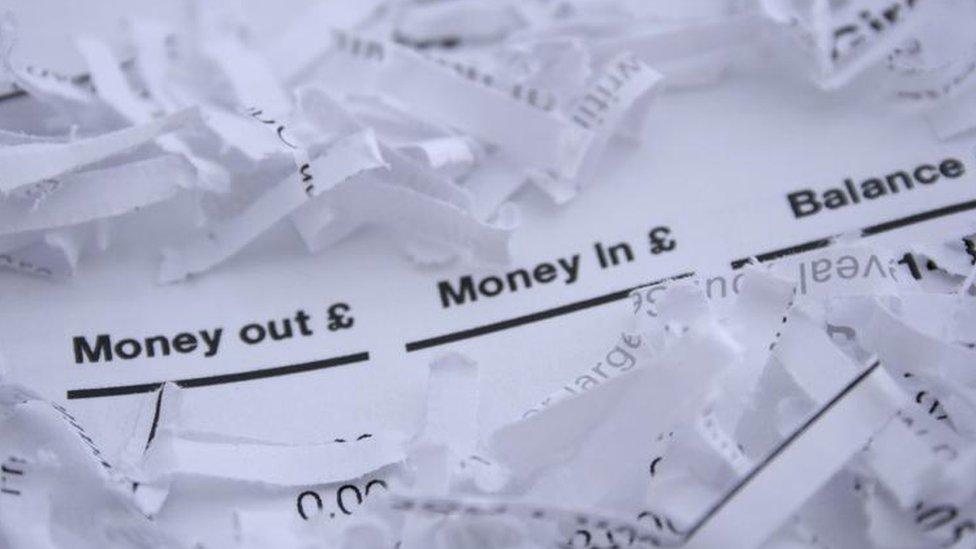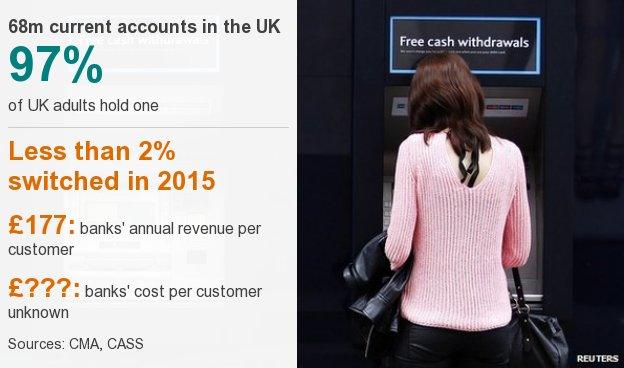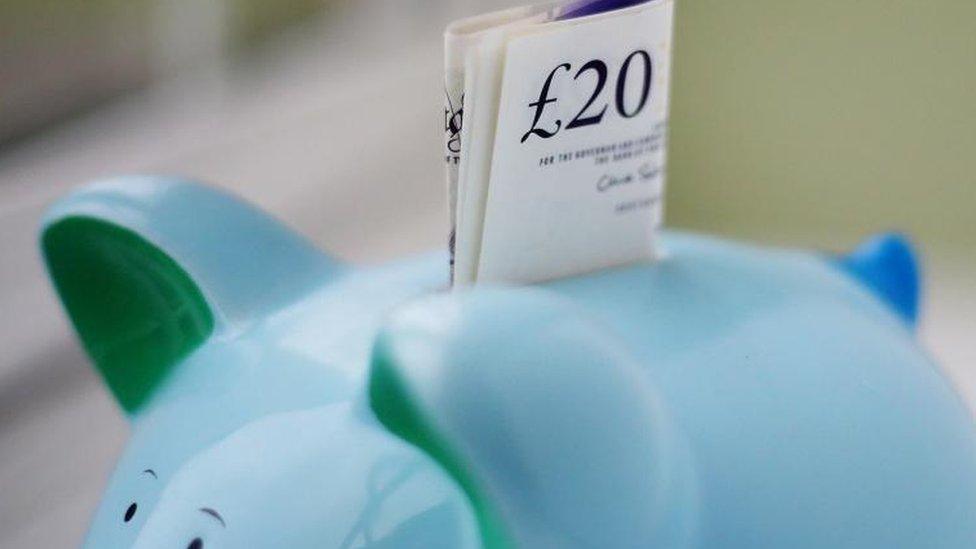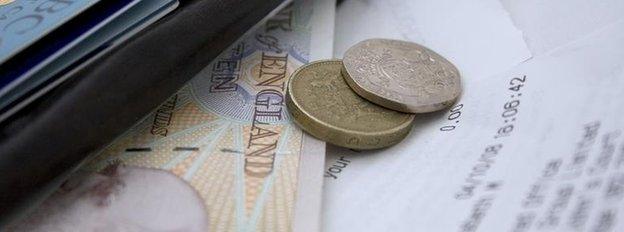Unpicking the current account banking 'con-trick'
- Published

The model of day-to-day banking used by most UK consumers is a "con-trick" and unnecessarily expensive for many, experts say.
"Free" current accounts - described by one academic as a "brilliant marketing ploy" - are often the most expensive option.
One consumer group has called for banks to be fined over the complexity of charges.
However, an inquiry has given the sector a relatively clean bill of health.
Many banks are engaged in financial charm offensive with potential customers, offering upfront cash incentives with new accounts which are more generous than the annual interest paid on many savings accounts.
Consumers appear to be giving them the cold-shoulder in return and sticking with "free" accounts. A switching rate of less than 2% last year was even lower than the previous 12 months.
So why are customers unwilling to move their money and what is the benefit for the banks? How can customers understand and make the most of their banking services? Will new technology offer banking at better value for money?
Ahead of the UK competition authority's final plan to fix frailties in the market, the BBC News website is examining the personal current account sector in a series of articles to be published over the next few days.
'Essential' accounts
68m current accounts in the UK
97%
of UK adults hold one
-
Less than 2% switched in 2015
-
£177: banks' annual revenue per customer
-
£???: banks' cost per customer unknown

There are 68 million current accounts which are active in the UK. They are being used by 97% of adults in the country - a bigger proportion, for example, than have a gas supply.
Of these, three-quarters have a so-called "free-if-in-credit" account.
Customers pay no monthly or annual fee, but they forgo a chunk of interest payments and may face a host of charges ranging from fees for going overdrawn to making purchases in foreign currency.
Current accounts are "essential for modern life", according to John Ashton, professor of banking at Bangor University Business School, but the effect of this "free" model is that those with the lowest and highest amounts in accounts subsidise those in the middle.
The poorest "bore the burden of overdraft costs". Middle income customers occasionally went into the red, but also tended to hold larger deposits in current accounts, for which they were missing out on interest payments they could have won elsewhere, he said.
Overdraft fees have been overhauled by banks since this research - in which Prof Ashton analysed 17 years of current account data to 2011 with Professor Robert Hudson, of the University of Hull. Yet, the fundamental issue was unchanged, Prof Ashton told the BBC.
"Over the long-term [free-if-in-credit] has not been a cheap way of getting banking services," he said.
"As a marketing ploy, it is brilliant."
'Myth'

Andrew Tyrie, chairman of the influential Treasury select committee of MPs, went further - describing free banking as "not just misleading, it is a con-trick".
"There is no such thing as free banking. The consumer, in my view, should have an opportunity to find out how much they are paying, as they expect to do with any other good and service," he told the BBC News website.
A recent report into the retail banking market by the Competition and Markets Authority (CMA) revealed that the banks' average revenue from each current account customer was £177 in a year.
To the obvious frustration of the Treasury committee, the CMA failed to unearth the average cost per customer of providing these current accounts.
"They [the banks] think about the value of customers over their lifetime, rather than the profitability of individual customers," Alasdair Smith, chairman of the CMA, told the committee at a recent hearing.
Mr Tyrie and his committee told the CMA that they should have delved deeper during their investigation.
"If banks do not know who they are making money from, this only serves to reinforce the fact that there is not enough competition in the market," Mr Tyrie told the BBC.
"In other industries, businesses which do not know where they are making money do not last very long. [Bank account price] is not as straightforward as a can of soup, but it is not beyond the wit of man.
"Customers are not given the opportunity to choose [between accounts] on the basis of price."


Also on the BBC:

Jargon-busting
An account's value for money - if this is possible to calculate - depends on which services a customer uses and how much he or she is charged for those services.
For example, a list of current account fees provided to the BBC by financial information service Moneyfacts reveals the type of charges often ignored by customers choosing an account.
For example, the Clearing House Automated Payment System (Chaps) is used for high-value payments made within a day. The fee for making a £100 payment through this system ranges from £12 to £40 with different accounts.
James Daley, managing director of consumer website Fairer Finance, said the most common charges for going into the red were almost impossible to compare.
"One of the main problems for bank customers today is that every bank has a different way of charging for overdrafts. Some have daily fees, some charge interest rates, some have buffers - and so it goes on," he said.
"If you are unlucky enough to go beyond your overdraft limit, things can be worse still. Some banks have 'returned item fees', some have 'unplanned borrowing charges', some have 'unpaid transaction fees'. Most of this means nothing to the average customer.
"Outside of overdrafts, jargon is at its worst. There are 'load' fees and 'non-sterling transaction charges' for using your card abroad, as well as fees for Chaps, Swift, Target and Sepa payments.
"Banks seem to revel in blinding their customers with complex language and jargon. Given that the FCA's rulebook already stipulates that customer communications need to be 'clear, fair and not misleading', we think most banks are in breach of the regulations.
"It is time for the regulator to start making an example of the worst offenders and even fining them."
The British Bankers' Association (BBA), which represents the UK's major High Street banks, said: "The industry has clear guidelines, external that covers the need for banks to communicate in a way which is clear, fair and not misleading.
"The banking industry is very much in favour of competition and actively encourages customers to shop around to get the best deals. Over the past five years, banks have introduced a number of different services to help customers keep on top of their money and compare offers so they can make informed choices and switch if appropriate.
"To give just a few examples of this commitment, customers can now see itemised charges on bank statements, over 1.3 million text alerts from banks are sent to customers each week. Customers are also provided with annual summaries and breakdowns of charges taken to help comparisons."
Thursday: How to get the most from your current account